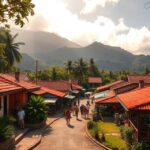Explore Tax Residency in Costa Rica Without Full-Time Living

Did you know that Costa Rica’s territorial tax system allows residents to pay taxes only on income earned within the country? This unique approach makes it an attractive destination for those seeking financial flexibility. Many wonder if it’s possible to establish residency here without committing to full-time living. The answer is yes, and this guide will show you how.
Costa Rica is renowned for its stunning natural beauty, mild climate, and welcoming expat community. It’s no surprise that individuals and families are drawn to this Central American gem. With options like Rentista, Investment, and Permanent Residency, the process is more accessible than ever.
This guide will walk you through the benefits of Costa Rica’s tax system, residency options, and what to expect. Whether you’re looking for a second home or a strategic financial move, this country offers a world of opportunities. Learn more about how to get residency in Costa and take the first step toward your new lifestyle.
Introduction to Costa Rica Residency and Tax Benefits

Costa Rica offers a unique blend of lifestyle and financial advantages for expats and families. With its stunning landscapes, affordable healthcare, and welcoming community, it’s no wonder many are drawn to this Central American paradise. The country’s territorial tax system adds another layer of appeal, making it a top choice for those seeking financial flexibility.
One of the standout features of Costa Rica’s tax system is its protection of foreign-sourced income. This means earnings from outside the country are not subject to local taxation. For expats with international income streams, this can lead to significant savings. Additionally, the country’s progressive income tax rates start at 0% for lower earnings, providing further financial relief.
Costa Rica offers several residency programs tailored to different needs. Options like Rentista, Investment, and Permanent Residency provide pathways to establish a life here. Each program comes with its own set of benefits, including access to the country’s high-quality healthcare system and lower living costs compared to many Western countries.
Key tax benefits include simplified filing processes and lower income tax rates. These advantages, combined with the country’s natural beauty and relaxed lifestyle, make Costa Rica an attractive destination for those looking to enhance their quality of life while optimizing their financial situation.
Understanding the Main Question: Can I be a tax resident in Costa Rica without living there full-time?

Many people assume that establishing tax residency in Costa Rica requires full-time living, but this isn’t the case. The country’s laws provide flexibility, allowing individuals to qualify as tax residents without being physically present year-round. This opens doors for those seeking financial advantages while maintaining a global lifestyle.
Clarifying Tax Residency Requirements
To become a tax resident in Costa Rica, one must meet specific criteria. The most common rule is the 183-day threshold. Spending more than 183 days in the country during a tax year qualifies an individual as a resident for tax purposes. However, full-time living isn’t mandatory.
Residents are taxed on income earned within Costa Rica, while foreign-sourced income remains exempt. This territorial tax system offers significant savings for those with international earnings. Non-residents, on the other hand, are only taxed on Costa Rican income.
Benefits of a Territorial Tax System
Costa Rica’s tax system is designed to attract individuals and businesses seeking financial flexibility. One of its key features is the exemption of foreign income from local taxation. This means earnings from outside the country are not subject to Costa Rica’s income tax laws.
Additionally, the progressive income tax rates start at 0% for lower earnings, providing further financial relief. For expats and global citizens, this system simplifies tax obligations and reduces overall liability. It’s a strategic advantage for those looking to optimize their financial situation.
Understanding these benefits can help individuals make informed decisions about their residency status. For more detailed guidance, explore our Costa Rica legal services to navigate the process smoothly.
Diverse Residency Options in Costa Rica

Costa Rica provides a range of residency options tailored to diverse lifestyles and financial goals. Whether you’re seeking flexibility, long-term stability, or investment opportunities, the country offers pathways to suit your needs. From Rentista to Permanent Residency, each program comes with unique benefits designed to enhance your quality of life.
Rentista and Investment Residency Explained
The Rentista program is ideal for individuals with steady passive income. Applicants must deposit $60,000 in a Costa Rican bank and demonstrate monthly transfers of $2,500 for two years. This option is perfect for those who want to enjoy the country’s lifestyle without full-time employment.
For business-minded individuals, the Investment Residency program requires a minimum one-time investment of $150,000 in real estate, stocks, or other eligible opportunities. This route not only grants residency but also opens doors to potential financial growth. Both options provide access to Costa Rica’s high-quality healthcare and social security systems.
Permanent Residency and Its Long-Term Benefits
Permanent Residency offers long-term stability and a pathway to citizenship. After three years of temporary residency, applicants can apply for permanent status. This option is ideal for those planning to make Costa Rica their forever home.
Permanent residents enjoy the same rights as citizens, including access to healthcare and education. They also benefit from the country’s territorial tax system, which exempts foreign income from local taxation. For more details on the benefits of obtaining residency in Costa, explore our comprehensive guide.
Exploring the Rentista and Pensionado Programs

Costa Rica’s Rentista and Pensionado programs offer tailored solutions for expats seeking residency with financial flexibility. These programs cater to individuals with steady income streams, providing pathways to enjoy the country’s lifestyle without full-time employment. Understanding the income thresholds and required documents is essential for a smooth application process.
Income Requirements and Documentation Needed
The Rentista program requires a minimum monthly income of $2,500 or a $60,000 deposit in a Costa Rican bank. This option is ideal for those with passive income sources, such as investments or rental properties. Applicants must provide proof of consistent monthly transfers for two years.
For retirees, the Pensionado program is a popular choice. It requires a lifetime monthly pension of at least $1,000. This program is designed for individuals seeking a relaxed lifestyle in Costa Rica while enjoying the benefits of residency.
Essential documents include birth certificates, marriage certificates, police records, and fingerprinting. These must be apostilled and translated into Spanish. Consistent income evidence is crucial for both programs, ensuring applicants meet the financial criteria.
These programs cater to different financial profiles, offering flexibility for expats. Whether you’re a retiree or an investor, Costa Rica’s residency options provide opportunities to enhance your quality of life while meeting your financial goals.
Establishing a Tax Residency Without Full-Time Living
Establishing tax residency in Costa Rica doesn’t require full-time living, offering flexibility for global citizens. The process is straightforward and designed to accommodate those who split their time between countries. Here’s a step-by-step guide to help you navigate the application process efficiently.
Step-by-Step Process Overview
First, gather all required documents, including proof of income, a valid passport, and a police clearance certificate. These documents must be apostilled and translated into Spanish. Next, ensure you meet the 183-day threshold within the tax year to qualify as a resident.
Submit your application to the Costa Rican tax authorities, either in person or through a legal representative. The process includes paying an official fee, which varies depending on your residency category. Keep a copy of your application receipt for follow-up purposes.
After submission, schedule an appointment for fingerprinting and additional verification. This step is crucial to complete your application. Once approved, you’ll receive your tax residency certificate, granting you access to the country’s territorial tax system.
It’s essential to maintain precision throughout the process. Missing documents or incomplete forms can delay approval. For expert assistance, consider consulting Costa Rica legal services to ensure a smooth experience.
The Costa Rican Tax System at a Glance
Costa Rica’s tax system is designed to be simple and beneficial for both residents and expats. Its progressive structure ensures fairness, while territorial taxation offers significant advantages for those with international income. Understanding how it works can help optimize financial planning.
Understanding Progressive Tax Rates
The progressive income tax rates in Costa Rica range from 0% to 25%, depending on earnings. For example, income up to ₡929,000 ($1,500) is tax-free, while amounts over ₡4,783,000 ($7,900) per month are taxed at 25%. This structure ensures lower earners pay less, while higher earners contribute more.
Corporate income tax follows a similar pattern, with rates ranging from 10% to 30%. This flexibility makes Costa Rica an attractive destination for businesses and individuals alike. The system’s simplicity reduces the burden of compliance, allowing residents to focus on their financial goals.
Tax Filing Deadlines and Requirements
The tax year in Costa Rica runs from October 1 to September 30, with returns due by February 15. Meeting these deadlines is crucial to avoid penalties. Residents must file annual returns, while non-residents are only taxed on income earned within the country.
Key documents include proof of income, bank statements, and identification. For expats, understanding these requirements can simplify the process. Working with a local tax professional can ensure accuracy and compliance.
Costa Rica’s territorial tax system exempts foreign income from local taxation. This feature is particularly beneficial for expats with international earnings. By focusing on income earned within the country, the system reduces overall tax liability for residents.
Residency Versus Non-Residency for Tax Purposes
Understanding the distinction between residency and non-residency in Costa Rica is crucial for managing tax obligations effectively. The country’s tax system treats these statuses differently, impacting how income is taxed and what compliance measures are required.
To qualify as a tax resident, individuals must spend more than 183 days in Costa Rica during a fiscal year. This includes days of entry and exit, with sporadic absences of up to 30 consecutive days still counting toward the total. Once this threshold is met, individuals are considered residents for tax purposes.
Residents are taxed on income earned within Costa Rica, while foreign-sourced income remains exempt. This territorial approach offers significant financial advantages, especially for those with international earnings. Non-residents, on the other hand, are only taxed on income generated within the country.
For example, a resident with a local business and foreign investments would only pay taxes on the business income. A non-resident earning rental income from a Costa Rican property would only be taxed on that rental income. These distinctions simplify tax planning and reduce overall liabilities.
Compliance requirements also vary. Residents must file annual tax returns, while non-residents only report Costa Rican-sourced income. Understanding these differences ensures proper adherence to local laws and maximizes financial benefits.
Documentation and Application Requirements for Residency
Navigating the documentation process for Costa Rica residency requires attention to detail and proper preparation. Ensuring all necessary paperwork is complete and correctly formatted is essential to avoid delays. This section outlines the key documents and steps to streamline your application.
Essential Documents: Birth Certificate, Marriage Certificate, and More
To apply for residency, specific documents are mandatory. These include a birth certificate, marriage certificate (if applicable), and a police clearance certificate. Each document must be valid and up-to-date. For families, birth certificates for dependent children under 18 or up to 25 if they are university students are also required.
Police records must be valid for six months and cover the applicant, spouse, and any children aged 15 to 25. These documents ensure compliance with Costa Rican immigration laws and verify the applicant’s background.
Tips for Getting Documents Apostilled or Translated
All documents must be apostilled or authenticated by a Costa Rican consulate. The apostille process confirms the document’s legitimacy for international use. For non-English documents, certified translations into Spanish are mandatory. This ensures the local authorities can process your application efficiently.
Common errors include incomplete translations or missing apostilles. To avoid these, work with certified translators and legal experts familiar with Costa Rica’s requirements. Proper preparation saves time and prevents unnecessary setbacks.
Having official documents in Spanish is a legal requirement. This ensures clarity and compliance with local regulations. By following these steps, you can ensure a smooth and successful residency application process.
Navigating the Application Process for Costa Rican Residency
Applying for residency in Costa Rica involves a structured process that ensures clarity and efficiency. The first step is gathering all required documents, including proof of income, a valid passport, and a police clearance certificate. These must be apostilled and translated into Spanish for submission.
Next, visit the Direccion General de Migracion y Extranjeria to submit your application. The initial fee is $50, with additional costs of up to $250 depending on the residency category. Retaining the application receipt is crucial for tracking progress and addressing any issues that may arise.
Processing times typically range from 6 to 12 months. During this period, applicants can track their status online or through the immigration office. Once approved, the next milestone is registering with the social security system, which grants access to healthcare and other benefits.
Compliance with local regulations is essential throughout the process. Missing documents or incomplete forms can lead to delays. For a smoother experience, consider consulting legal experts familiar with Costa Rica’s residency requirements.
By following these steps, applicants can navigate the process efficiently and achieve their goal of obtaining residency in Costa Rica. This structured approach ensures clarity and minimizes potential setbacks.
How to Maintain Compliance with Costa Rican Tax Laws
Staying compliant with Costa Rican tax laws is essential for residents and expats alike. Meeting annual filing requirements ensures you avoid penalties and maintain financial stability. Understanding the process and deadlines is key to staying on track.
Annual Tax Return Filing: What You Need to Know
In Costa Rica, residents must file annual tax returns by February 15. This applies even if you don’t live in the country full-time. The Declaración de Impuesto sobre la Renta form is used to report income earned within the country.
Procedures include gathering proof of income, bank statements, and identification. All documents must be accurate and submitted on time. Missing deadlines can result in fines or additional scrutiny from tax authorities.
Best practices include keeping detailed records and consulting a tax professional. This ensures accuracy and helps you navigate complex regulations. Compliance not only avoids penalties but also builds trust with local authorities.
Penalties for non-compliance can range from fines to legal action. For example, late filings may incur a 1.5% monthly interest charge on unpaid taxes. Severe cases could lead to audits or criminal charges.
Seeking professional tax help is advisable for complex situations. Experts can guide you through the process and ensure all requirements are met. This is especially useful for expats unfamiliar with Costa Rica’s tax system.
Understanding Social Security and Health Benefits for Expats
Expats in Costa Rica enjoy access to one of the best healthcare systems in Latin America. The Caja Costarricense de Seguro Social (CCSS) provides comprehensive coverage, ensuring peace of mind for residents. Understanding how to register and the benefits available is essential for a smooth transition.
Registration Process and Contribution Rates
To register with the CCSS, expats must provide proof of income and residency status. Monthly contributions range from 7% to 11% of income, depending on earnings. Employers also contribute 26.67%, while employees pay 10.67% of their salary.
This system ensures access to healthcare, disability, and retirement benefits. For example, a family of four typically pays less than $100 monthly for full coverage. The process is straightforward, with most expats completing registration within a few weeks.
Benefits Available for Expats
The CCSS covers a wide range of services, including doctor visits, surgeries, and maternity care. Expats also benefit from disability and retirement plans, providing long-term security. Private health insurance is an option, but public coverage is highly regarded for its affordability and quality.
Special considerations include ensuring all documents are translated into Spanish and apostilled. Working with a local expert can simplify the process and ensure compliance with local regulations.
By understanding the social security system, expats can fully enjoy the benefits of living in Costa Rica. This knowledge helps secure their future while taking advantage of the country’s world-class healthcare.
Comparing Living Costs and Tax Advantages in Costa Rica
Costa Rica’s affordable living costs and tax benefits make it a top choice for expats. The country offers a budget-friendly lifestyle while providing significant financial advantages. This combination attracts individuals and families seeking a high quality of life without breaking the bank.
Living in Costa Rica is notably cheaper compared to many developed countries. For example, a one-bedroom apartment rents for $250 to $500 monthly, while a three-bedroom home costs between $615 and $825. Groceries, transportation, and utilities are also more affordable, making daily expenses manageable.
Property ownership is another attractive aspect. Real estate prices in the greater metropolitan area range from $800 to $3,500 per square meter. Additionally, property taxes are low, with a standard rate of 0.25% of the registered value. For a $200,000 home, this amounts to just $500 annually.
Tax advantages further enhance the financial appeal. Costa Rica’s territorial tax system exempts foreign income from local taxation. This means expats with international earnings can save significantly. The progressive income tax rates, starting at 0%, also provide relief for lower earners.
Cost comparisons help expats plan their budgets effectively. A single person can live comfortably on $1,600 to $2,000 monthly, while retired couples need $2,000 to $3,000. These figures include housing, utilities, groceries, and entertainment, making Costa Rica an affordable paradise.
By combining low living costs with tax benefits, Costa Rica offers expats a unique opportunity to enjoy a relaxed lifestyle while optimizing their finances. Whether renting or buying property, the financial advantages are clear and compelling.
Impact of Residency Status on Income Tax and Offshore Income
Understanding how residency status impacts income tax and offshore earnings is crucial for financial planning in Costa Rica. The country’s territorial tax system offers distinct advantages, but the rules vary based on whether you are a resident or non-resident. This section explores these differences and their implications for your financial obligations.
Tax residents in Costa Rica are those who spend more than 183 days in the country during a fiscal year. They are taxed on income earned within the country, while foreign-sourced income remains exempt. Non-residents, on the other hand, are only taxed on Costa Rican-sourced income. This distinction simplifies tax planning for expats with international earnings.
Costa Rica’s progressive income tax rates range from 0% to 25%, depending on earnings. For example, income up to ₡863,000 ($1,500) is tax-free, while amounts over ₡4,445,000 ($7,900) per month are taxed at 25%. These rates apply to residents, while non-residents pay flat rates of 10%, 15%, or 25% based on income type.
Capital gains are generally taxed at 15%, with a potential reduced rate of 2.25% under specific conditions. Rental income is taxed at a flat rate of 15%, with no deductions for expenses. Interest from investments is taxed at 15%, or up to 30% if part of a business. These rules ensure clarity and fairness in the tax system.
Reporting offshore income correctly is essential for compliance. Residents must file annual tax returns by February 15, even if they don’t live in the country full-time. Non-residents only report Costa Rican-sourced income. Working with a local tax professional can help ensure accuracy and adherence to local laws.
By understanding these rules, expats can optimize their financial strategies and minimize tax liabilities. Costa Rica’s territorial tax system provides significant advantages, making it an attractive destination for those seeking financial flexibility.
Opening a Bank Account in Costa Rica: A How-To Guide
Opening a bank account in Costa Rica is a straightforward process that offers expats and businesses access to reliable financial services. Whether you’re an individual or running a business, understanding the requirements and steps involved can make the process seamless. This guide provides practical insights to help you navigate the banking system efficiently.
Documentation and Practical Steps
To open a bank account, you’ll need specific documents. These typically include a valid passport, proof of residency, and proof of income. Some banks may also require a local reference or additional identification. For U.S. citizens, an IRS form may be necessary to comply with international banking regulations.
Major banks like Scotiabank and Banco de Costa Rica offer accounts in both Costa Rican colons (CRC) and U.S. dollars (USD). Choosing the right account type depends on your financial needs. CRC accounts are ideal for local transactions, while USD accounts are better for international transfers.
State-associated banks, such as Banco Nacional, are known for their security and reliability. They often provide additional benefits for residents, including lower fees and better customer service. Private banks, on the other hand, may offer more personalized services and faster processing times.
For international transfers, modern services like Wise and Revolut can simplify the process. These platforms offer competitive exchange rates and lower fees compared to traditional banks. Always verify the transfer limits and fees before initiating a transaction.
By following these steps and preparing the necessary documentation, you can open a bank account in Costa Rica with ease. This ensures access to essential financial services while enjoying the country’s vibrant lifestyle.
Capitalizing on Powerful Tax Strategies as an Expat
Expats in Costa Rica can unlock significant financial benefits through strategic tax planning. By understanding the country’s territorial tax system, individuals can optimize their income and reduce liabilities. This section explores advanced strategies to help expats make the most of their financial opportunities.
One effective approach is leveraging business deductions. Expats running a business can deduct expenses like office supplies, travel, and marketing costs. These deductions lower taxable income, providing substantial savings. Keeping detailed records ensures compliance while maximizing benefits.
Investment income is another area to focus on. Costa Rica exempts foreign-sourced income from taxation, making it ideal for expats with international investments. Dividends and interest earned abroad remain untaxed, allowing for greater financial growth. Properly structuring investments can further enhance these advantages.
Calculating and claiming interest income is straightforward. Expats must report local interest earnings, which are taxed at 15%. However, foreign interest remains exempt. This distinction simplifies tax planning and reduces overall liabilities.
Maintaining compliance is crucial. Expats should file annual tax returns by February 15, even if they don’t live in Costa Rica full-time. Working with a local tax professional ensures accuracy and adherence to regulations. This minimizes risks while maximizing financial benefits.
Real-life examples illustrate these strategies in action. For instance, an expat with rental properties abroad can enjoy tax-free income under Costa Rica’s territorial system. Similarly, a business owner can deduct operational expenses, significantly lowering their tax burden.
By implementing these strategies, expats can achieve financial flexibility while enjoying Costa Rica’s vibrant lifestyle. Proper planning and compliance ensure long-term success and peace of mind.
Maintaining Your Residency While Benefiting from Tax Exemptions; Planning for Long-Term Residency and Citizenship; Conclusion
Maintaining residency in Costa Rica offers both financial flexibility and a pathway to long-term stability. By renewing your residency status and staying compliant with local laws, you can continue to enjoy the benefits of the territorial tax system. This includes exemptions on foreign income and access to social security benefits.
For those planning long-term, permanent residency and citizenship are achievable goals. After three years of temporary residency, you can apply for permanent status, which opens doors to citizenship. This process requires minimal in-country presence, making it ideal for global citizens.
Living in Costa Rica, even part-time, provides a unique blend of lifestyle and financial advantages. From affordable healthcare to a lower cost of living, the benefits are clear. To explore more about the benefits of naturalization in Costa Rica,
Article by Jonnathan Morales
Start Today!
Call or WhatsApp (+506) 7182-8969
https://www.jaroscr.com/


